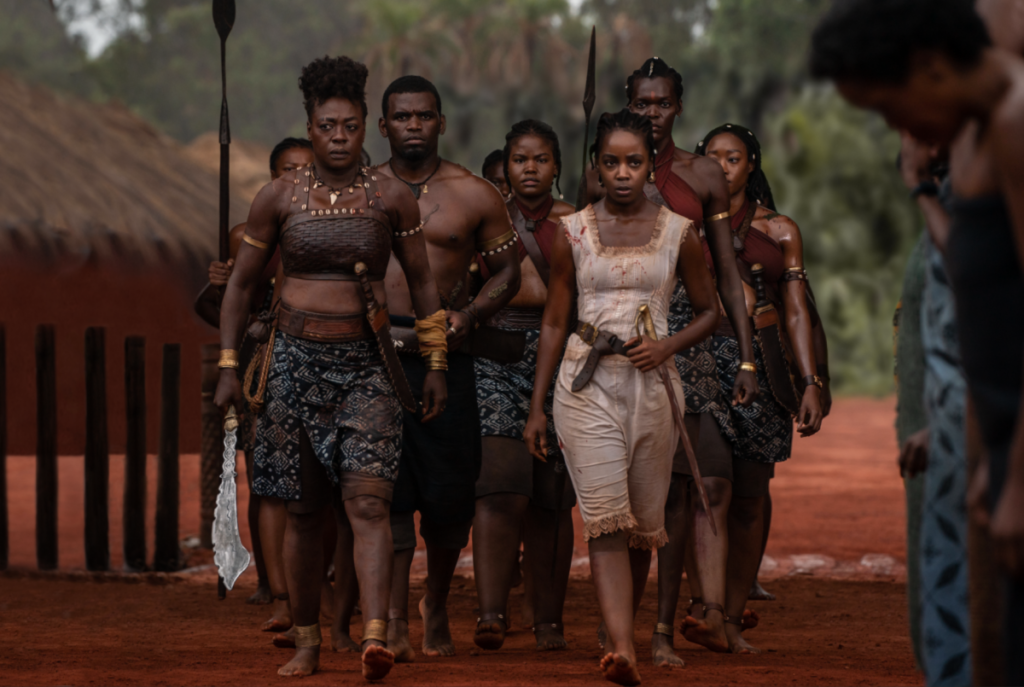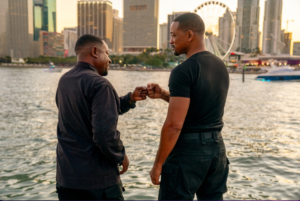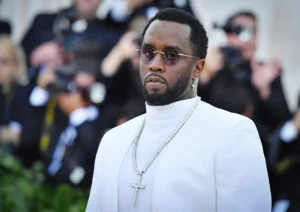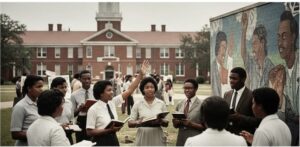‘The Woman King’ reigns supreme

by MARGRIRA
At the time of filing, Sony’s “The Woman King” was projected to have an $18 million opening from 3,765 locations, according to analysts’ estimates concentrating on the weekend haul. The action film, directed by Gina Prince-Bythewood, had a $50 million production budget and has no ties to an existing franchise.
Make no mistake “The Woman King” is an action-adventure and solid entertainment with a strong story about standing up against those who want to dominate your life. This drama is about the real women soldiers of the precolonial Kingdom of Dahomey in West Africa. Under the brilliant direction of Prince-Bythewood, this film travels the viewer into a time period, long gone, that was filled with palace intrigues, ceremonies, and brutal battles where every soul on the field of battle demonstrated an act of courage that makes you shiver.
Let’s keep the focus firmly on the facts (as we know them). This story has its roots wrapped around the women warriors of Dahomey. However, their exact origins are wrapped in oral tradition and rehashed by European observers so who’s to say what the “truth” is since history (his-story) is always written by the victorious and rarely (if, ever) by the victims.
But here’s what we know. These warriors emerged around the 17th century and were associated with a strong female social organization that included wives and separated sides (male/female) of the compound where they defended their home.
Visually, these women are striking with a sense of pride in their luxurious attire. King Ghezo (played by John Boyega), the young monarch in power, allows others to do his dirty work, keeping his hands free from the bloody mess of holding power, giving that duty to the women warriors.
The story is set in 1823 and never shies away from showing the blood flow and bone-crushing work it takes to live in this world. To keep their enemies shaking in fear, battle-scarred General Nanisca (Viola Davis) is at the helm, dispatching her opponents in quick order.
Prince-Bythewood understands how to create tension with her visceral action scenes placing us right on the ground so we can watch these brave women fly and land on their targets. The weapons of choice are diverse including javelins, twirling ropes, swords, the occasional gun—and the long, razored fingernails that scoop out enemy eyes, and thighs that crack bones.
I think you understand without seeing the movie that “The Woman King” is about strong, African women who have control and balance of their bodies, minds, and souls. They know who they are and are clear about who they will not become no matter how the price is set for freedom.
The slave trade in Africa was practiced for hundreds of years and the Dahomey was part of this and you can’t look away from those facts.
The screenplay, written by Dana Stevens from a story by her and Maria Bello, deftly navigates the political and moral threads as expressed through Nanisca’s personal opinion about the trade, which she expresses to the king, since their very future is in jeopardy with the behind-the-scene plotting done by the kingdom’s principal rival, the Oyo Empire (Jimmy Odukoya), which is thick into the slave trade selling to the greedy Europeans. Hate him or admire him, Oyo is a visual feast for the eyes, in his wrapped turbans, riding in on his horses.
I can’t mention it enough that Prince-Bythewood’s direction is packed with an intensity seen in every battle and in the determined looks on the faces of the warriors. When Nanisca bellows the battle cry, laying out the facts that they must fight or perish, it makes one wonder if given a chance, would every captured African person have chosen to die on the feet than live on their knees?
The subplot of “The Woman King” drags the film, in a few places, which involves a young upstart, Nawi (Thuso Mbedu) who’s left at the palace by her family. A classic naïf who knows little of how the world works, she has to be taught and tested. Watching Nawi transform into a skilled fighter, shaped by her mentor, Izogie (Lynch), a ferocious warrior, helps move the audience through the story. If there is a weak part in this film, it’s the screenplay and not the direction.
Now to the question of a possible Oscar nomination. I say, yes, Davis should be added to the growing list of best actress contenders that already includes Michelle Yeoh (“Everything Everywhere All at Once”) and Cate Blanchett (“Tár”).
Viola Davis won best supporting actress at the 89th Oscars (2017) for “Fences” and is a four-time Oscar nominee. Also, keep your eye on Thuso Mbedu who industry insiders say was snubbed for an Emmy for “The Underground Railroad” and in this film, she shines in a co-leading performance, holding her own with Davis.








